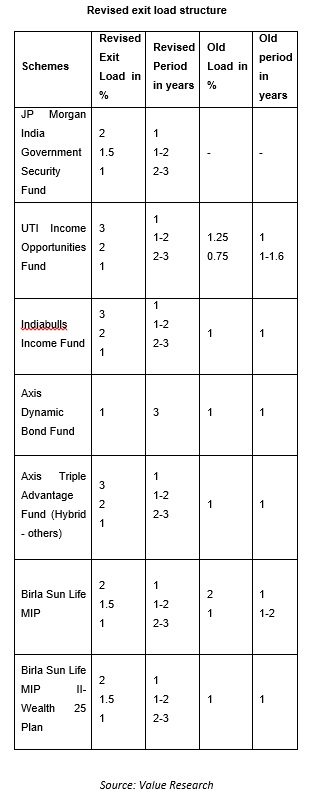In just a month’s time, ten fund houses have either increased their exit load charges or extended the tenure across 19 debt funds. Majority of them have extended the tenure to three years.
After increasing expense ratios and exit load structure of equity funds across all categories, some fund houses have now turned their focus on revising exit load structures of debt funds. In just a month time, ten fund houses have either increased their exit load charges or extended the tenure across 19 schemes, shows Value Research data.
In fact, five fund houses – Birla Sun Life, Axis, JP Morgan, UTI and Indiabulls have not only increased their exit load structure but also extended their load tenure up to three years.
UTI, Axis and Indiabulls have almost tripled their load charges in UTI Income Opportunities Fund, Axis Triple Advantage Fund and Indiabulls Income Fund respectively. Similarly, JP Morgan and Birla Sun Life have hiked their exit load charges to 2%. All these schemes have extended their load tenure to three years.
Other fund houses like Reliance, ICICI Prudential, DWS, Peerless and Taurus too have revised their exit load structure.
While Birla Sun Life Dynamic Bond Fund, Reliance Medium Term Fund and Peerless Income Plus Fund have increased their exit loads charges, Birla Sun Life Income Plus, Birla Sun Life Short Term Opportunity Fund, Birla Sun Life MIP II Savings 5 Plan, Birla Sun Life Monthly Income, Taurus Dynamic Income Fund, ICICI Prudential MIP 5, ICICI Prudential Regular Savings Fund, Reliance Floating Rate Fund - Short Term Plan and DWS Investment Opportunities Fund extended their tenure.
Experts are of the view that fund houses have hiked the exit load charges and tenure on expectation of rate cut. Since bond prices and interest rate have an inverse relationship, any fall in the interest rate leads to a rise in the bond prices as well as the NAV of the gilt fund and vice-versa. Also, longer the duration of the securities/portfolio higher will be the capital appreciation and vice-versa.
Secondly, after Union Budget announcement, investors have to hold a debt fund for 3 years to get any benefit of long-term capital gain (LTCG), they added.
Akshay Gupta, Associate Director & CEO, Indiabulls Mutal Fund said that his company has revised exit load structures in order to dissuade investors from redeeming their investments so that they can make money in the long term.
A senior official from another fund house which has revised their exit load structure said, “Fund managers are increasing average maturity across income funds. Hence, we don’t want to take redemption pressure. It can hurt the performance of the scheme.”
Hemant Rustagi of Wiseinvest Advisors said, “There is a possibility of rate cut in the near future. Since interest rate and bond yield move in opposite direction, any rally in debt market may compel investors to redeem their investments. Hike in exit load charges and tenure can discourage such a move.”
“Debt fund managers are increasing average maturity in the portfolio on anticipation of rate cut. Also, the fund managers follow income accrual strategy in a portfolio consisting of corporate bond funds. Any redemption pressure may hurt the performance of such funds,” pointed out Vidya Bala, Head – Mutual Funds Research, FundsIndia.com.
Vishal Dhawan of Plan Ahead Wealth Advisors attributed this hike to revision of long term capital gain tax in the union budget. “Since the union budget has increased long term capital gain in non-equity funds to three years, investors have to stick to their debt funds investment to avail double indexation benefit. Hence, many fund houses have extended their exit load tenure to three years.”
However, some advisors have a different view. A Mumbai based distributor said that the fund houses have increased the tenure of debt funds in order to recover upfront commission paid to the distributors. High exit load charges and longer tenure ensure that investors do not exit the fund quickly, he added.




